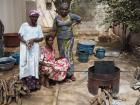12.10.2014 | Protestbrief gegen die Schließung von Choucha
Im September 2014 haben die tunesischen Behörden angekündigt, das Wüstenlager Choucha endgültig schließen zu wollen – und das obwohl in dem Lager weiterhin mehrere Dutzend Menschen ohne jede Perspektive leben. Vor diesem Hintergrund hat Afrique-Europe-Interact zusammen mit anderen Organisationen und Netzwerken einen Appell veröffentlicht, der weiterhin die sofortige Aufnahme der in Choucha verbliebenen Flüchtlinge in Europa fordert. Der Aufruf ist leider nur auf englisch und französisch verfügbar.
To UNHCR, IOM, the Tunisian Red Cross, the Tunisian government and all the actors involved in the management of Choucha camp:
Aware of the notice given by IOM and the Tunisian Red Cross to the people still living in Choucha camp about the forthcoming eviction of the camp, we, as a group of researchers, activists, academics and members of human rights organizations from Europe and Tunisia, denounce the intolerable treatment that you are planning to do against the refugees who have been living in the camp since 2011, with no effective solution for a space to stay. Humanitarian actors left those refugees dying in the desert after the official closure of the camp in June 2013, and most of them in fact have tried to cross the sea risking their lives –some also died. Now, you are trying to chase them from the only space they have for living, and without giving them any solution to their illegal) status in Tunisia – both refugees and rejected refugees are currently without a residence permit. You suggest them to resettle themselves in the Tunisian cities, but which kind of integration are you thinking about for people that UNHCR has denied of the international protection and who are now treated as illegal migrants in Tunisia?
You have also encouraged them to go back to their country of origin, as if they would have gone to Libya and then fled to Tunisia for leisure. Some of them were born in Libya or in Choucha and have never seen their so-called country of origin, others fear political persecution in case they go back.. Moreover, the ridiculous amount of money offered by IOM for the “voluntary return” sounds as a mockery to those who spent years and years in Libya and whose life there has been destroyed by the war. The other automatic non-solution that you have not the courage to explicitly tell, is their last resort to take a boat and cross the Mediterranean: you are leaving them with no solution than risking to die at sea.
With this statement we would like to address also the European Union to resettle in Europe all these (few) people left at Choucha camp and to state that we won’t leave people in the Choucha camp alone. We will monitor your actions. What you are trying to do as an ordinary measure, is indeed something that we will try to oppose in all the ways that we can. By leaving the people in the desert and now planning to evict them, you show the failures and the consequences of the European politics of externalization of asylum. These people have been living in the desert in a dangerous zone near the Ras Jadir border since 2011, while in Libya the political crisis is getting worse and worse: how can you say that they are not people of humanitarian concern? Many of them are sick, old or women with children – at least for those most vulnerable people there must be a solution!
We do not say that Choucha is the solution for them: a camp is never a solution, actually it is a system of containment of people’s mobility. However, today Choucha is not a camp anymore, it is the only space where they can stay, and it is the space in which they carry on their struggle for claiming their resettlement in a third country: Many of them tried in vain to integrate in Tunisia, did not get jobs, experienced racism and bad treatment – so they returned to the camp.They are not still there for living their life at Choucha, but as a form of political collective struggle to demand a real solution, and you have been trying to tame their resistance since the beginning., Acknowledging the work all of you have done in the aftermath of the Libyan war we strongly believe that it is highly inhuman not to think of a concrete solution for people still living in the Choucha camp and who are unable to return to their so-called country of origin. These people are striving to survive since more three years now. Thus, we will continue to support their struggle and to hamper in any ways your strategy of abandonment and illegalization of people, and we will closely follow your next steps, firmly demanding to UNHCR and to the European Union:
- The resettlement of the people at Choucha camp in a safe third-country and to grant all of them a humanitarian protection as people who fled the Libyan war, that was supported also by European states.
- To reopen their asylum dossiers considering the current geopolitical situation at the Tunisian-Libyan border
- To grant all the people at Choucha a concrete possibility of building their life in a safe space and to immediately regularize their juridical status.
- To not evict the camp and to allow people from Choucha to come to Europe in a safe and legal way.
Signatures:
Martina Tazzioli, Universtity of Oulu, Finland; Glenda Garelli, University of Illinois at Chicago, USA; Debora Pistoia, Tunis, Tunisia; Francesca Zampagni, Vienna, Austria; Conni Gunsser, Afrique-Europe Interact, Germany; Miriam Edding, Siftung:do, Germany; Monica Scafati, Italy; Marta Bellingreri, Tunis, Tunisia; Nicanor Haon, France; Hagen Kopp, No one is Illegal, Hanau, Germany; Marion Bayer, Welcome to Europe, Germany; Mireille Urbaine, LaCimade, Marseille, France; Serge Slama, France; Helmut Dietric, Germany; Samuel Gratacap, photographer; Giulia Breda, University of Nice, France; Cinzia Greco, Crea, Roma, Italy; Abidi Najib, videomaker, Tunis, Tunisia; Imed Soltani, Association La terre pour Tous, Tunis, Tunisia; David Landau, No one is Illegal; Fulvio Vassallo, University of Palermo, Italy; Judith Gleitze, Borderline Sicilia, Italy; Walid Fellah, videomaker, Tunisia; Vanda Mariucci, Italy; Elisa Marini, Italy; Nicoletta Salvi, Turin, Italy; Choukri Bakar; Gabriella Guido, Lasciatecie Entrare, Italy; Galya Ruffer, Center for Forced MIgration Studies, Northwestern University, Chicago, US; Toni Negri, Philosopher, Paris, France; Sandro Mezzadra, University of Bologna, Italy; Nicholas De Genova, King’s College, London, UK; Judith Revel, University of Paris Ouest-LaDefense, France; Federica Sossi,University of Bergamo, Italy; Maurice Stierl, Warwick University, UK; Mimmo Perrotta, University of Bergamo, Italy; Swanie Potot, University of Nice; David Fedele, Videomaker and journalist; Oana Parvan, Goldsmiths, University of London; Stefania Donzelli, University of Amsterdam; Alessia Tibollo, Italy; Dario Del Pistoia, Italy; Rossana Pezzini, Italy; Andrea Cocco, AMISNET, Italy; Teresa Hayter, UK; Mauro Savo, Ravenna, Italy; Mario Sommella, ALBA Articolo 3; Lorenzo Pezzani, Goldsmiths College, London; Leonie Ansems De Vries, Queen Mary University, London; Yari Lanci, Goldsmiths College, London; Filippo Furri, Parigi, EHESS, Paris; Marguerite Rollinde; researcher, France; Aurore Mottet, researcher, University of Nice; Neva Cocchi, Meltingpot Europa, Italy; George Cuff, Refugee support service, British Red Cross; Oliver Belcher, University of Oulu, Finland; Mark Griffiths, University of Oulu, Finland; Lauren Martin, University of Oulu, Finland; Alessandra Sciurba, Meltingpot and University of Palermo, Italy; Jose Royem, University of British Columbia, Canada; Bruno Colet, Belgium; Antionio Guarino, Italy; Stefano Galieni, Corriere Immigrazione and Rifondazione Comunista, Italy; Irene Peano, University of Bologna, Italy; Federico Oliveri, University of Pisa, Italy; Eli Mc Bett; Orazio Irrera, University of Paris I, France; Hamadi Zribi, Tunis, Tunisia; Patrizia Mancini, Tunisi, Tunisisia; Giada Frana, Italy; Francesco Diasio, Italy; Sergio Reyes, Immigrant Rights Activist, Boston, USA; Pascale Ratovonony, Biarritz, France; Rosanna Conti, Melzo, Italy; Kais Zriba, Journalist, Tunis, Tunisia; Michele Galliera, Italy; Walter Gussoni, Pontremoli, Italy; Simona Ferrari, Italy; Camara Laye, Coordinateur Conseil des Migrants Subsahariens au Maroc; Martine Devries, Calais, France; Mario Antomelli, Milano, Italy; Céline De Vos, étudiante, Bruxelles, Belgium; Norma Claire Moruzzi, University of Illinois at Chicago, USA; Jose Royes, University of British Columbia, Canada; Teresa Hayter, UK; Nadia Hammami, intervenant juridique et chercheuse, Nice, France; Heidi J. Nast, Professor, DePaul University; Martine Devries, Calais, France; Céline De Vos, étudiante, Bruxelles, Belgium; Emmanuel Gatoni Sebatutsi, refugee, formerly at Choucha camp; Camara Laye, Coordinateur Conseil des Migrants Subsahariens au Maroc; Evelina Gambino, Goldsmiths College, UK; Michela Summa, University of Heidelberg, Germany. Le forum Tunisien pour les Droits Économiques et sociaux, FTDES; Hamburger Stiftung für Migranten; Siftung:do, Germany; JAFEM, Joint Action for those Forced to Emigrate; Network of Social support of refugees and migrants, Athens, Greece; Flüchtlingsrat Hamburg (Refugee Council Hamburg), Germany; Borderline Europe, Sicily; Rete antirazzista catanese, Italy; Osservatorio Iraq, Italy; Tunisia-in-Red; LasciteCie Entrare; ALBA, Italy; Network of Social Support to Refugees and Migrants, Athens, Greece; Le Comité de Vigilance pour la Démocratie en Tunisie, Belgique; L'Association des Tunisiens en France; Network of Social Support to Refugees and Migrants, Greece; AMISnet: Agenzia Multimediale di Informazione Sociale, Italy; Flüchtlingsrat, Germany; Conseil de migrants subsahariens au Moroc; La Coalition Internationale des Sans-Papiers et Migrants, CISPM; Coordination 75 des sans-papiers, CSP75; Association Droits Ici et Là-Bas, DIEL.



